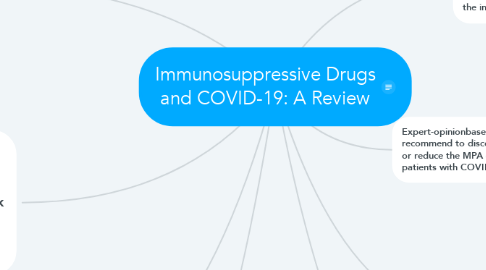
1. An RCT found that dexamethasone use was associated with a lower 28-day mortality rate, a shorter length of hospital stay and a lower prevalence of mechanical ventilation.
1.1. Patients treated with mechanical ventilation, dexamethasone reduced the risk of mortality with 36% (95% CI 19–49%), whereas dexamethasone had no effect on the mortality rate of patients who did not require oxygen support.
1.1.1. Immunosuppressive drugs can be used to prevent and treat the hyperinflammatory phase of COVID-19.
2. Two (2) cohort studies have opposite results, They found that steroid use was associated with a higher risk of blood stream infections and a lower 10-day remission rate.
2.1. There were no studies that found that corticosteroid use was associated with accelerated SARS-CoV-2 clearance. However, some cohort studies found that steroid use was associated with a delay in SARS-CoV-2 clearance
2.1.1. Other studies report that steroid use was not associated with SARS-CoV-2 clearance time
3. Patients with severe COVID-19 have high levels of IL-6 ( like tocilizumab) shows lower mortality and ICU admission rate.
3.1. Other cohort studies report contradictory results which is it is not clear yet whether IL-6 inhibitors can be used to prevent and treat the cytokine storm
3.1.1. The observational studies for corticosteroids and IL-6 inhibitors report contradictory results, which is probably related to heterogeneity in study populations. In many studies there are differences in patient characteristics (such as age, gender and comorbidity) and treatment regimens between patients in the intervention group and control group.
4. Differences between SARSCoV-2, SARS-CoV and MERS-CoV. First, the nucleotide sequence of the genome of SARS-CoV-2 is only 79.7% similar to SARS-CoV
4.1. The similarity of the nucleotide sequence of envelope, nucleocapsid and spike proteins is as high as 96, 90, and 77%
4.1.1. The similarity of the genome of SARS-CoV-2 and MERSCoV is only 54%, and for the spike protein, a transmembrane protein involved in binding of the virus to the host receptor, 31.9%
4.1.1.1. MERS-CoV uses dipeptidyl peptidase 4 (DPP4) as host cell receptor, while SARS-CoV-2 and SARS-CoV use ACE2
5. For the study, 30 papers that looked at how immunosuppressive medications affect SARS-CoV-2 infection met the inclusion criteria.
5.1. These studies investigated the effects of corticosteroids, mycophenolic acid (MPA), anakinra or tocilizumab.
5.1.1. MPA inhibits SARS-CoV-2 replication in-vitro
6. Expert-opinionbased guidelines recommend to discontinue MPA or reduce the MPA dose in patients with COVID-19
6.1. Based on the results of their review, this approach can be questioned. Clinical studies are needed to confirm the inhibitory effect of MPA on SARS-CoV-2 replication in-vivo.
7. CNIs and mTOR inhibitors inhibit the viral replication of SARS-CoV and MERSCoV in-vitro
7.1. There is also indirect evidence that thiopurine analogues inhibit the viral replication of SARS-CoV.
8. Limitations: They're only searched one database and there was no second reviewer
8.1. The study only included “genuine” immunosuppressive drugs in our review
8.1.1. They exclude antiviral/antiparasitic drugs, like (hydroxy)chloroquine, despite the fact that some would argue that this drug has immunosuppressive properties.
